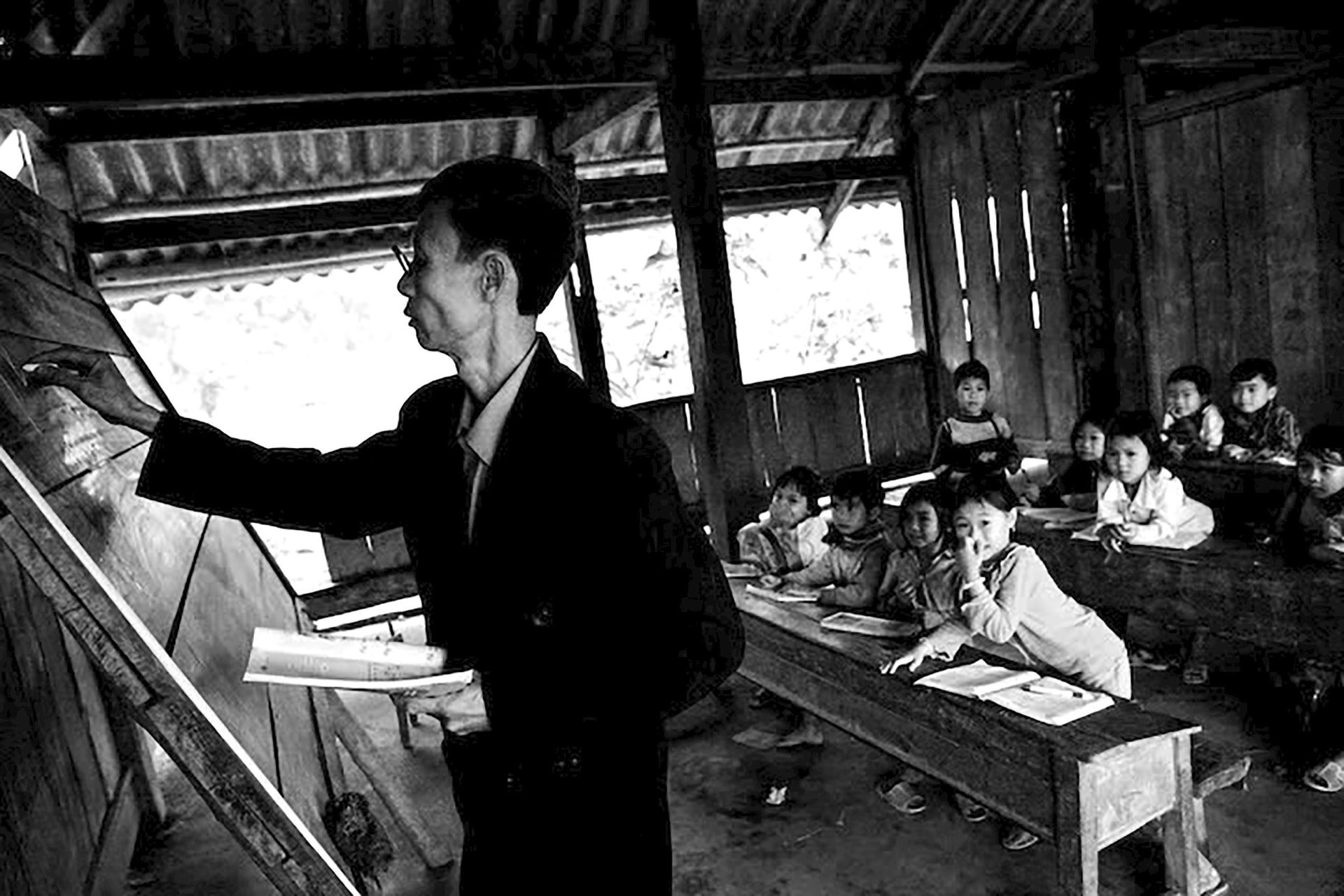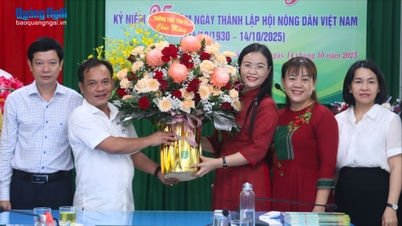In the old days of the last century, people in the countryside were very familiar with the word "village teacher". This word often referred to people who worked as teachers in their hometowns and villages. "Village teacher" referred to teachers from primary school in the village to high school in the district.

From those who graduated from grade 7 plus 2 to those who graduated from grade 10 plus 2 and went to teach. Even those who graduated from university, college or high school and joined the teaching staff in primary, secondary and high schools are all called "village teachers". Obviously they are teachers from village and district schools, art doesn't seem to be very suitable, but it is clear that those teachers, those teachers, live in the same village, neighboring villages, upper and lower communes in the district know each other. Teachers who have gone to university in Hanoi have been assigned to their hometowns, district schools to teach.
The way teachers and students go to school every morning is through villages, through fields or inter-commune and inter-village roads. Many teachers from other provinces who are assigned to work at schools often stay in the school's dormitory and sometimes, in their conversation, they miss the city, miss the town, they say: I joined the "village teacher" team. This is the art, some people do not like it, because it seems like people are criticizing "country people". That is said because in the past, the city, the town had electricity, tap water, very different from the countryside, open water, digging soil, single-family houses, people born and raised in the city, town must miss their home. And many people consider the years of studying at the village school as a "stepping stone" for them to transfer back to the city, social vision or at least suburban areas to shorten the distance to their home, from the scene of eating pots of rice and filtered water in the dormitory. For female teachers, they are even more eager to be transferred because they are still busy building a family, having children, living a few kilometers away from home, and having to find a bicycle to go to the city or town is very tiring. Love is "first distance, second intensity", there are urban couples who have failed because of 2 people but because of "long distance". And also from simple village schools, in the middle of fields, along the market road, or sometimes in old cemeteries, there are people who have married local people and become "village teachers" in their husband's or wife's hometown.
Many people will remember that in those years, the road to the school's dormitory had soldiers who were not allowed to return home much, but every night they would neatly adjust their uniforms and go to school. There were those who rode Sim Son motorbikes and went home with that flower, and those who escaped from work in the city or far away provinces also had the opportunity to go to the school dormitory to "check it out".
In the past, if the villagers were "strong" enough, then the high-ranking officials were "valuable". There was nothing better than a village teacher whose husband was a soldier, everyone supported her, so she "won" and the wedding was quickly organized. The teacher went to her husband's house after the wedding, returned the apartment to the school and the city girl began to get acquainted with the life of the villagers in a real way. She also went to teach one day, came home one day to eat vegetables and bran, when the season came, she raised fish, and at night she worked hard to prepare lesson plans. Her husband was far away, the letters from his wife sometimes blurred with tears.
But it was okay, in those days no one thought that with all the hardships and difficulties, as long as there was faith, there would be strength to endure. The letters she sent home were never read by her family, but the whole village knew that although she had only learned to farm after getting married, she knew the job, for sure. Usually, soldiers' wives suffer first, then enjoy happiness.
And when the young teacher became a teacher, he might just come back near home. The children – the result of those times he was allowed to come back – had not grown up, thinking about the teacher's house, settling down, how much salary did the teacher get to retire. When a person retires, his children and grandchildren follow the tradition, everyone in the village is important.
That journey is told in just a dozen lines but spans several decades, with both sadness and joy and bitterness. But it is said that "all was peaceful".
That is the story of the teacher about becoming a daughter-in-law of the village, but the story of the village "teacher" seems to go more smoothly.
After 2, 3, 4 years of studying at teacher training schools, some of the girls have gone far away, whether they follow the profession or not, they may have "married to a foreign land" and settled in their husband's or wife's hometown. Most people still find a way to return to the district or commune to teach, there is nothing better than eating home-cooked meals and teaching at a village school.
After struggling through a low-paying trial period, the girls often want to quit their jobs, but who would let them quit? They don't get to study, work in the fields, or go to the market, so they quit. And of course, with the teaching job in our commune or neighboring communes, young unmarried female teachers are "more expensive" than... fresh shrimp. Many families ask matchmakers to make a name for themselves and then quickly "attack" them. To get a village teacher, they usually have to come from a well-mannered, well-educated, wealthy, and unmarried family. The men also have to be educated, have a job, and be handsome... On moonlit nights, dogs bark loudly in the alleys of the village teachers' houses, and groups of village boys and men from other countries are seen swinging axes.
The girls, although still hesitant, sometimes simply want to play more, wait for a better salary or don't want to be tied down to husband, children, or being a daughter-in-law, they don't want to choose anyone but it's difficult because the villagers are very strong, "if you want to get married, get married right away".
And the village teachers brought flowers and lesson plans to their husbands' houses at a very young age.
Before becoming village teachers, some of the teachers' children, the children of the escaped families, were all skilled in farming and other jobs. Usually, after teaching, they returned to their husbands' homes, also doing housework, embroidery, baking, and wine making like everyone else. Many of them even brought their own jobs to their husbands' homes. Looking at them carrying their schoolbags, dressed neatly and elegantly, when they returned home, they were no different from the villagers, real farmers.
"Village teachers have a salary", everyone knows that, much more than farmers who depend on rice and potatoes, but not everyone sees that they have to work twice as hard. That is, they have to teach and work in production, planting and harvesting, growing crops, and raising livestock like everyone else.
"Village teachers" work hard and sometimes suffer "disadvantages", that is, sometimes people say harsh words, it's okay, but if teachers say harsh words or talk back, they are "judged" immediately. Many people, without understanding the situation, conclude that they are "bad teachers". Many "village teachers" have to cry to their husbands or sisters to share. More than anyone else, being villagers, teachers understand this "bullying" very well and they have certainly all encountered it.
November 20th is the Teachers' Day, surely the students of the 7X generation and earlier remember the "famous gifts" they gave their teachers. The whole class made an appointment to visit the teacher's house, ate a whole basket of apples and then went home. Sometimes the bouquet of flowers was "stolen from the old people's nursery", some students did not know how to buy, so they gave her lilies on this day. She was not angry but said:
- Let me put flowers and incense on the altar of my ancestors.
No material gift is worth being alone with the children, their parents, or the people in the village. The teacher-student relationship is built up over the years, so that the following year we can tell stories of the year before, and the year before that. To tell the teacher the story of our lives. I remember: The waitress's hand hurt, I remember the singer at the house. I remember the lesson the homeroom teacher taught without teaching a single word, leaving the lesson intact and with enthusiasm.
45 kids looked at each other, not knowing what to think. Some equipment was empty, some kids were leaving. I wonder if there was a teacher at that time. I guess… there was.
But after several years, the students still remember every word the teacher taught, and always call him "my teacher". And that's enough, every new spring, every village festival, every November 20th, the students of the old village school come back to the village to visit the old village teachers.
These generations of village teachers have reduced poverty and suffering in front of many teachers and friends, leaving teachers and students both moved, wondering what gift is more precious.
In the old days, if the villagers were "powerful", the officers were "valuable". There was nothing better than a village teacher having a soldier husband, everyone supported her, so she "won" and the wedding was quickly organized. The teacher went home.
After the wedding, her husband returned the apartment to the school and the city girl began to get acquainted with the life of the villagers in a real way. She also went to teach one day, came home one day to sell vegetables and bran, and when the season came, she raised fish, and at night she worked hard to prepare lesson plans. Her husband was away for a long time, and the letters she received from his wife sometimes blurred with tears.
But it was okay, in those days no one thought that with all the hardships and difficulties, as long as there was faith, there would be strength to endure. The letters she sent home were never read by her family, but the whole village knew that although she had only learned to farm after getting married, she knew the job, for sure. Usually, soldiers' wives suffer first, then enjoy happiness.
Source: https://daidoanket.vn/giao-lang-10294434.html



![[Photo] Ready for the 2025 Fall Fair](https://vphoto.vietnam.vn/thumb/1200x675/vietnam/resource/IMAGE/2025/10/14/1760456672454_ndo_br_chi-9796-jpg.webp)





































































































Comment (0)